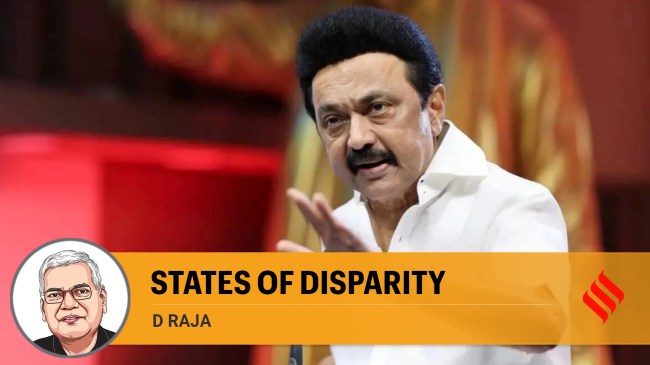Opinion With overbearing Centre, delimitation can undermine federalism
The 2026 delimitation must ensure a framework that safeguards the interests of all states while ensuring equitable representation
 Tamil Nadu Chief Minister MK Stalin has called a meeting of major political parties from Tamil Nadu, Kerala, Karnataka, Andhra Pradesh, Telangana, Odisha and Punjab.
Tamil Nadu Chief Minister MK Stalin has called a meeting of major political parties from Tamil Nadu, Kerala, Karnataka, Andhra Pradesh, Telangana, Odisha and Punjab. While dedicating the new Parliament building to the nation in May 2023, Prime Minister Narendra Modi said, “We also need to consider where people will sit when the number of seats increases and the number of MPs increases in the near future.” This assertion, coupled with the freeze on delimitation, being set to lapse in 2026, has brought the debate around delimitation centre stage. The question of the formula to be followed, the BJP-led Union government’s chequered record on federalism and the disproportionate population growth between northern and southern states have intensified concerns about fairness and equity. Tamil Nadu Chief Minister MK Stalin has called a meeting of major political parties from Tamil Nadu, Kerala, Karnataka, Andhra Pradesh, Telangana, Odisha and Punjab. Thus, an understanding of delimitation, why it was frozen and its implications for our political landscape are needed for an informed debate.
Article 82 of the Constitution mandates Parliament to enact a Delimitation Act after every Census to reflect population changes. Article 170 determines the composition of state legislative assemblies based on population data. Article 55 ensures the proportional representation of states in the presidential election. Article 81 specifies the number of seats in the Lok Sabha and provides for their distribution among states based on population. Following the 42nd Amendment in 1976, the process of increasing parliamentary seats was frozen to avoid penalising states that had successfully implemented family planning measures. This was extended by the Vajpayee government until the first census after 2026.
The upcoming delimitation, based on the next census, could severely reduce the representation of South Indian states while significantly enhancing that of North Indian states. Currently, Uttar Pradesh, Bihar, Rajasthan and Madhya Pradesh collectively hold 174 out of 543 seats (32 per cent) in the Lok Sabha. Tamil Nadu, Kerala, Andhra Pradesh, Telangana, and Karnataka hold 129 seats or 24 per cent. If the total number of seats remains frozen at 543, projections suggest that these North Indian states would gain significantly, holding 205 seats while South Indian states’ representation would shrink to 103 seats. If the number is expanded to 888 — the sitting capacity in the Lok Sabha chamber of the new Parliament building — the North Indian states are expected to get 324 seats or 39 per cent of the total, while South Indian states are projected to get 164 seats, down to 19 per cent.
In 1971, Bihar and Tamil Nadu had comparable populations and similar representation in the Lok Sabha. Over the decades, Bihar’s population surged more rapidly, and its MPs today represent significantly more people than Tamil Nadu’s. Consequently, MPs from northern states now represent substantially larger constituencies. This disparity underscores the challenge that southern states face in the upcoming exercise. The reality is that northern states now hold 50 per cent of India’s population, up from 43 per cent according to the 1971 Census, while southern states’ share has declined from 25 per cent to 20 per cent.
Southern states have consistently voiced concerns over the post-2026 delimitation process for several reasons. They have excelled in family planning measures, stabilising their populations. Delimitation based solely on population risks penalising them. Politically speaking, the BJP, till now, has failed to make much headway in South India, barring in Karnataka. Reducing representation can be a way of penalising the southern states for this.
The threat to federalism is another key concern. The BJP has displayed a pattern of centralising power. Examples include the imposition of Hindi on non-Hindi speaking states, the financial discrimination against states like Kerala, imposing the NEP and interference in state-specific welfare policies. These actions have fuelled concerns that delimitation may further undermine federalism.
Tamil Nadu, Kerala, Telangana and Karnataka, among others, contribute disproportionately higher shares to India’s GDP and taxation revenues compared to their northern counterparts. Despite this, their political representation is at risk. The potential for diminished representation raises concerns about economic injustice as well. States that have invested in improving healthcare, education and social infrastructure risk being penalised.
To mitigate these concerns, constitutional safeguards are essential. Weightage for population control must be incorporated in the delimitation process . Economic contribution, developmental achievements and governance success should be factored in. Delimitation must ensure equity and respect for the contributions of all regions. A framework that safeguards the interests of all states while ensuring equitable representation will uphold the principles of justice and democracy. India’s strength lies in its diversity. A delimitation process that tilts the scales disproportionately risks alienating regions that have played a key part in the country’s progress.
The writer is general secretary, CPI



